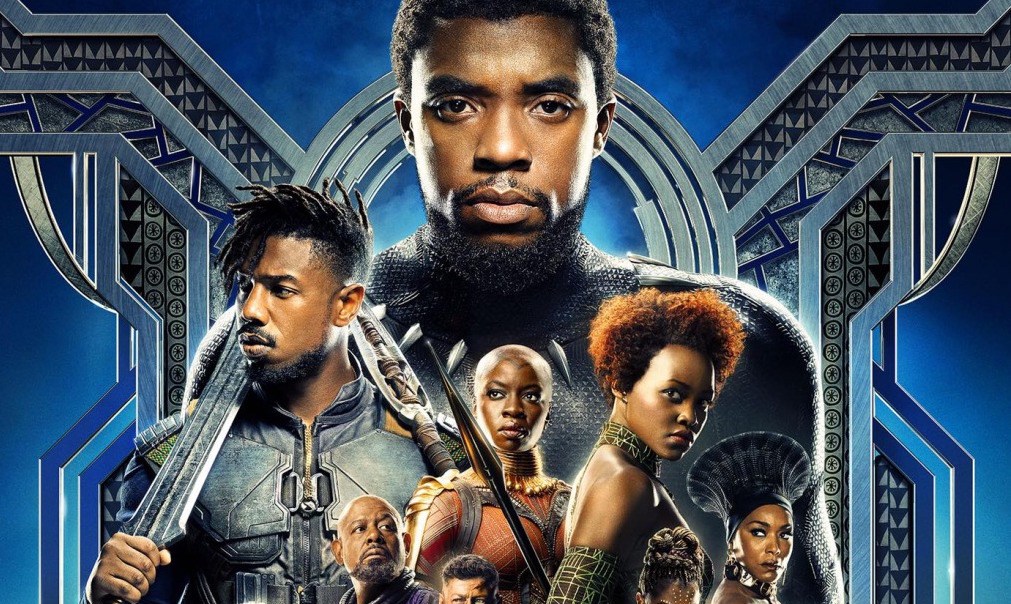About halfway through watching the new blockbuster Black Panther, I realized that I no longer noticed that the characters have dark skin. This was white privilege, of course; reviewers who are persons of colour relish every exquisite moment of a hidden world where sophisticated, innovative African peoples are in the majority.
Getting respect for all the right reasons, Black Panther is a huge box office hit, raking in $192 million its first weekend, and overtaking first-place competitor The Avengers by midweek, with $200 million in earnings.
A week later, momentum is still building, with $500 million in box office. Welcome to the gamechanging movie that gently subverts the superhero genre to make it more meaningful.
The movie disproves industry myths — yet again. “The lessons of Black Panther are obvious,” writes Scott Mendelson in Forbes Magazine. “Big movies with and for Black people are not remotely box office poison. Big movies with, for and by Black people can absolutely pull in good to great overseas grosses as well. It’s a rebuttal of conventional wisdom.”
The movie brings a new viewpoint and aesthetic because “[t]here has never in the history of cinema been a film that allows an ensemble of Black characters to take charge on a global scale quite like this,” as Peter Debruge wrote in Variety, “and many have waited their entire lives to witness just such a feat (the way that Wonder Woman was a hugely empowering game changer for women).”
The movie frames superhero T’Challa’s life with strong autonomous women who guide and support him, while fulfilling their own roles and goals. Lupita Nyong’o told Black Entertainment Television that “what I love about the women of Wakanda that Ryan wrote into this movie is that they’re all so specific and all so powerful in their own way. And they occupy very different roles and influences on the king, you know. And that is important to see, especially for young girls.”
BET notes that “Letitia Wright’s Shuri, the teenage genius and sibling of T’Challa, steals every scene she’s in and has some of the most memorable lines in the film.” Also, as Variety comments about General Gurira, a “scene in which she tosses aside a bad wig [and attacks with a spear while wearing a scarlet dress] ranks as the most gay-friendly Marvel moment to date.”
The movie inspires deep philosophical interpretations from one African-American critic who feels desperately torn from his African roots. “Black Panther is a love letter to people of African descent all over the world,” writes Adam Serwer in The Atlantic. Even the villain, Eric Killmonger (Michael B. Jordan) is a tragic figure with his own strong argument for justice.
“Killmonger’s stated purpose, to liberate Black people all over the world, has sparked a lively discussion over whether he is a bad guy to begin with,” writes Serwer. “What could be so bad about Black liberation?” He cites a friend who reflexively fist-pumped agreement to Killmonger’s speech about his goals. My heart leaped too, when he spoke so boldly.
Black Panther’s hidden land of Wakanda, fuelled by the miraculous mineral Vibranium, features cities with towers and minerets as well as lush jungles reminiscent of Avatar. The royal family, recently bereaved, travels in a round flat airplane that looks like a spacecraft.
As the heir apparent, T’Challa must be prepared to fight hand-to-hand to claim his throne — and his responsibilities. The wrestling ring is a pool of water jutting over a steep cliff, part of a tall mountain looming overhead, with Wakandans standing on ledges all the way up, cheering.
Vivid imagery and a practically literary narrative aside, Black Panther’s appeal to certain market segments indicates just how much they’ve been neglected. “In the U.S., celebrities like Octavia Spencer, Serena Williams and Travis Scott have pitched in and bought out theatres, eager for kids to see the Afrofuturistic world of Wakanda,” the CBC reported.
In Toronto, the Black Business and Professional Association raised enough money in 24 hours to offer free showings to 350 children and 100 parents and guardians. In the U.S., Black Lives Matter organizers created #WakandaTheVote, which is catching on nationally, with movie lobby registrations and a local number anyone could text to register to vote.
In New York, former Black Panther Party member Sekou Odinga (who served 33 years in prison) is using the movie to renew calls for clemency for the remaining Black Panther Party members who are languishing in prisons. I remember when the Chicago police shot Fred Hampton in his bed — some say, in his sleep.
And still, the movie’s story is what draws the audience. “I took my nephews to see Black Panther this week,” writes Chicago Tribune columnist Dahleen Glanton. “To them, he was simply another superhero. While I was totally engrossed in the excitement over a film featuring the first Black comic book superhero — a king with superhuman powers who rules over a technologically advanced African nation — the racial component went right over the heads of the six-, eight- and nine-year-olds….”
Of course, these are boys too young for their parents to have given them “the talk,” about how people of colour are routinely shunted aside and how some white people will try to treat them. They’ve lived with President Barack Obama for most of their lives, she said, and for them, “A Black president and even a Black superhero are the norm. What makes me most hopeful, though, is that it also is the norm for white children of their age.”
Image: Marvel studios
Like this article? rabble is reader-supported journalism. Chip in to keep stories like these coming.





